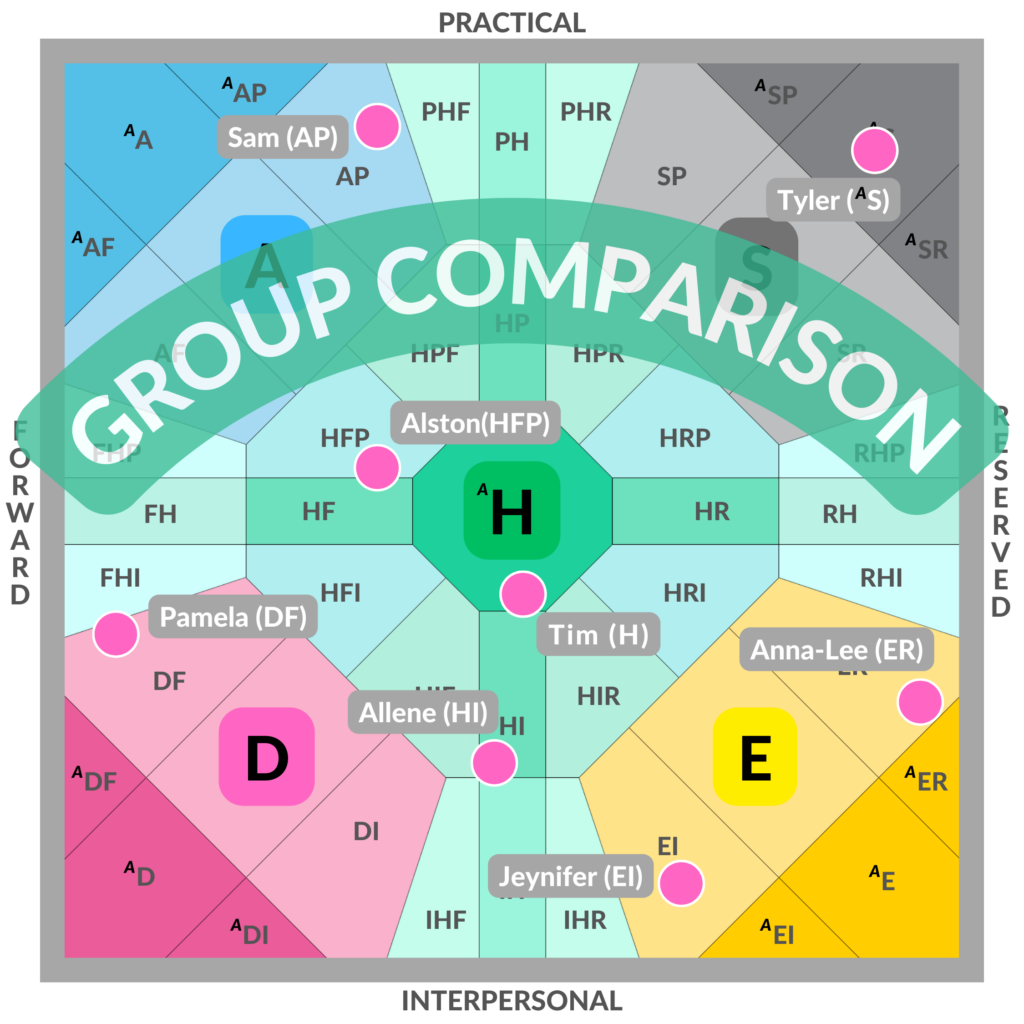Our Natural Behavioral Differences Revealed in the ABContrast’s H.E.A.D.S. Framework
Each of the Authentic Behavior Contrast’s five main H.E.A.D.S. types—Harmonic, Empathic, Autocratic, Dynamic, and Static—offers unique strengths that enhance communication, teamwork, leadership, and relationships. However, these differences often create friction when one type struggles to understand the approach and tendencies of another.
While it’s easy to admire traits like decisiveness, sensitivity, or balance in others, it’s not always easy to grasp how or why someone operates the way they do. Let’s explore what each H.E.A.D.S. type truly appreciates about the others—and why those same traits can sometimes be a challenge to comprehend.

Harmonic (H) Personality Types: objectively balanced
Harmonic types value balance and objectivity, and they admire how the other types commit deeply to their strengths:
- Empathic: Harmonics are impressed by the Empathic type’s deep care for others and ability to create emotionally supportive environments.
- Autocratic: They respect the Autocratic type’s decisiveness and boldness, which can cut through indecision in moments of uncertainty.
- Dynamic: Harmonics find the Dynamic type’s energy and charisma inspiring, marveling at their ability to motivate and connect.
- Static: They admire the Static type’s steadfastness and attention to detail, qualities that bring structure to chaos.
Harmonic types often feel caught in the middle. They may find it hard to grasp why:
- Empathic types prioritize feelings over practicality.
- Autocratic types can come across as overly forceful or dismissive of alternative views.
- Dynamic types push forward at high speeds without pausing to assess risks.
- Static types resist change even when adaptability seems logical.
For Harmonics, the challenge is maintaining their balanced perspective without becoming frustrated by the extremes that others exhibit.
Empathic (E) Personality Types: amiably supportive
Empathic types are deeply tuned into relationships and admire the strengths of others, even when they don’t fully understand them:
- Harmonic: They respect Harmonics’ ability to stay neutral and mediate, creating calm in tense situations.
- Autocratic: Empathics admire the Autocratic type’s decisiveness and willingness to take charge when necessary.
- Dynamic: They enjoy the Dynamic type’s enthusiasm and ability to energize a room, even if it feels overwhelming at times.
- Static: Empathics value the Static type’s consistency and reliability, especially when emotions are running high.
Empathic types often struggle to see why:
- Harmonic types can seem detached or overly objective in emotional situations.
- Autocratic types focus on goals over people, sometimes stepping on toes.
- Dynamic types appear impatient or interruptively dismissive of quieter approaches.
- Static types resist emotionally driven decisions, prioritizing structure over warmth.
For Empathics, the challenge is learning to appreciate others’ focus without feeling undervalued emotionally or as a “lesser” value person.
Autocratic (A) Personality Types: decisively compelling
Autocratic types insist on efficiency and results, and they can see great potential in the strengths of others:
- Harmonic: They admire Harmonics’ ability to weigh all sides and ensure decisions are well-balanced.
- Empathic: Autocratics respect the Empathic type’s skill in building trust and fostering team unity.
- Dynamic: They enjoy the Dynamic type’s ambition and flair, which aligns well with their forward-thinking nature.
- Static: Autocratic types appreciate the Static type’s groundedness and ability to create solid systems that sustain progress.
Autocratic types often find it hard to relate to:
- Harmonic types’ slower decision-making process when action is needed.
- Empathic types’ focus on feelings, which may seem irrelevant in high-stakes scenarios.
- Dynamic types’ tendency to prioritize inspiration over practicality.
- Static types’ aversion to taking risks or deviating from established routines.
For Autocratics, the challenge is balancing their drive for results with the often softer, milder strengths of others.
Dynamic (D) Personality Types: personably engaging
Dynamic types thrive on energy and connection, and they admire the complementary traits in others:
- Harmonic: They value Harmonics’ ability to maintain perspective and mediate conflict without drama.
- Empathic: Dynamics admire the Empathic type’s sincerity and emotional depth, which can soften their own high-energy approach.
- Autocratic: They respect the Autocratic type’s decisiveness and ability to lead with confidence, even if they clash at times.
- Static: Dynamic types appreciate the Static type’s ability to stay grounded and ensure that bold ideas are executed effectively.
Dynamic types often find it puzzling when:
- Harmonic types seem hesitant to take bold steps or disrupt the status quo.
- Empathic types prioritize feelings over fast-paced action.
- Autocratic types dismiss their collaborative, people-first approach.
- Static types resist innovation or stick to rigid processes.
For Dynamics, the challenge is harnessing their energy in a way that respects the slower, steadier methods of others.
Static (S) Personality Types: methodically composed
Static types excel in structure and consistency, and they admire the ways others bring unique value to the table:
- Harmonic: They respect Harmonics’ ability to balance competing interests and create equilibrium in complex situations.
- Empathic: Statics admire the Empathic type’s ability to foster strong relationships and build trust within teams.
- Autocratic: They appreciate the Autocratic type’s decisiveness and willingness to lead, even if they themselves prefer less assertiveness.
- Dynamic: Statics are inspired by the Dynamic type’s creativity and ability to energize others, even if it feels a bit chaotic.
Static types often have difficulty relating to:
- Harmonic types’ perceived lack of commitment to one clear direction.
- Empathic types’ prioritization of relationships over efficiency.
- Autocratic types’ push for rapid change, which feels destabilizing.
- Dynamic types’ fast-paced ideas, which can seem impractical or fleeting.
For Statics, the challenge is appreciating others’ flexibility and adaptability without losing their own sense of order.
Learning to Appreciate What We Don’t Understand
Each H.E.A.D.S. type brings invaluable strengths to the table, but differences in approach can create friction. By understanding what makes others tick, we can move past frustration and begin to truly value what they contribute—even if it’s hard to comprehend at first.
At Authentic Behavior Contrast, we help individuals and teams bridge these gaps by exploring the nuances of personality and behavior. In fact, these nuances are evident in 6 areas: thinking, socialization, leading, following, relationships, and teamwork. Want to learn more about how the H.E.A.D.S. types can work together effectively? Let’s start the conversation today.
START FOR FREE (a fun, 2-minute free personality test with instant results)
PREMIUM CONTENT (pathways for individuals, counselors and team leads)
CONTACT US (let’s chat about your specific needs)
LEARN EVEN MORE (our WHY US page)

